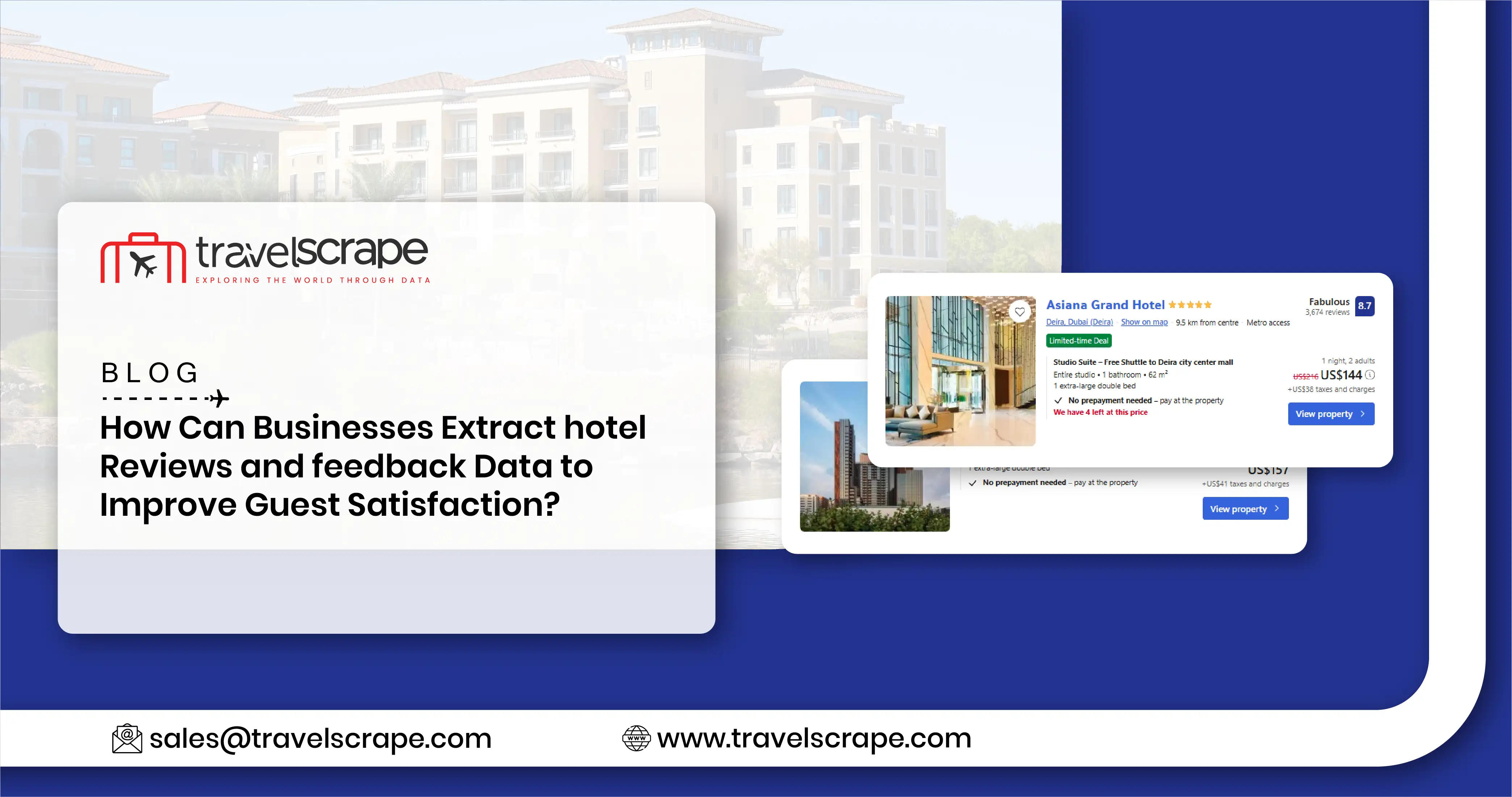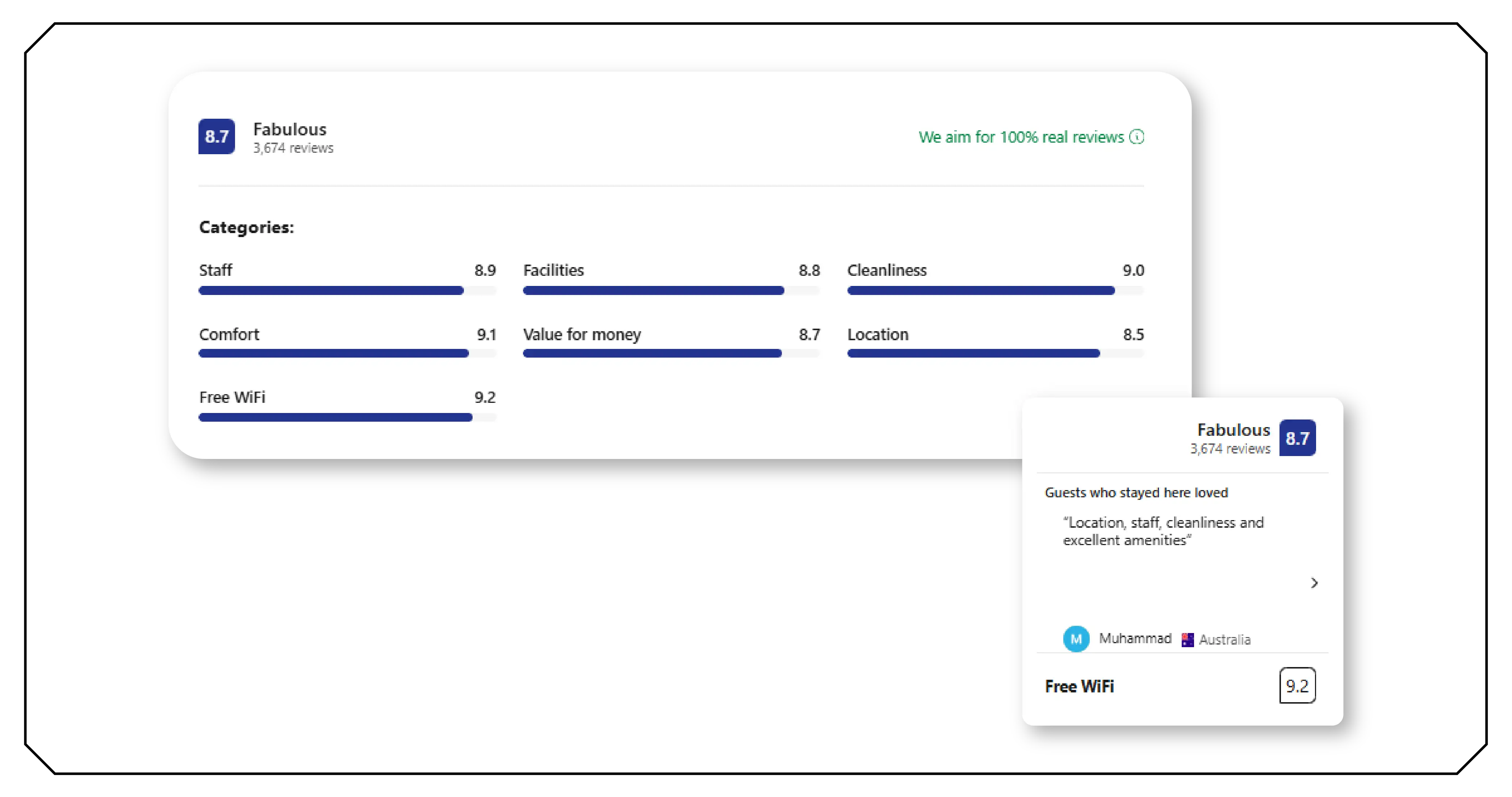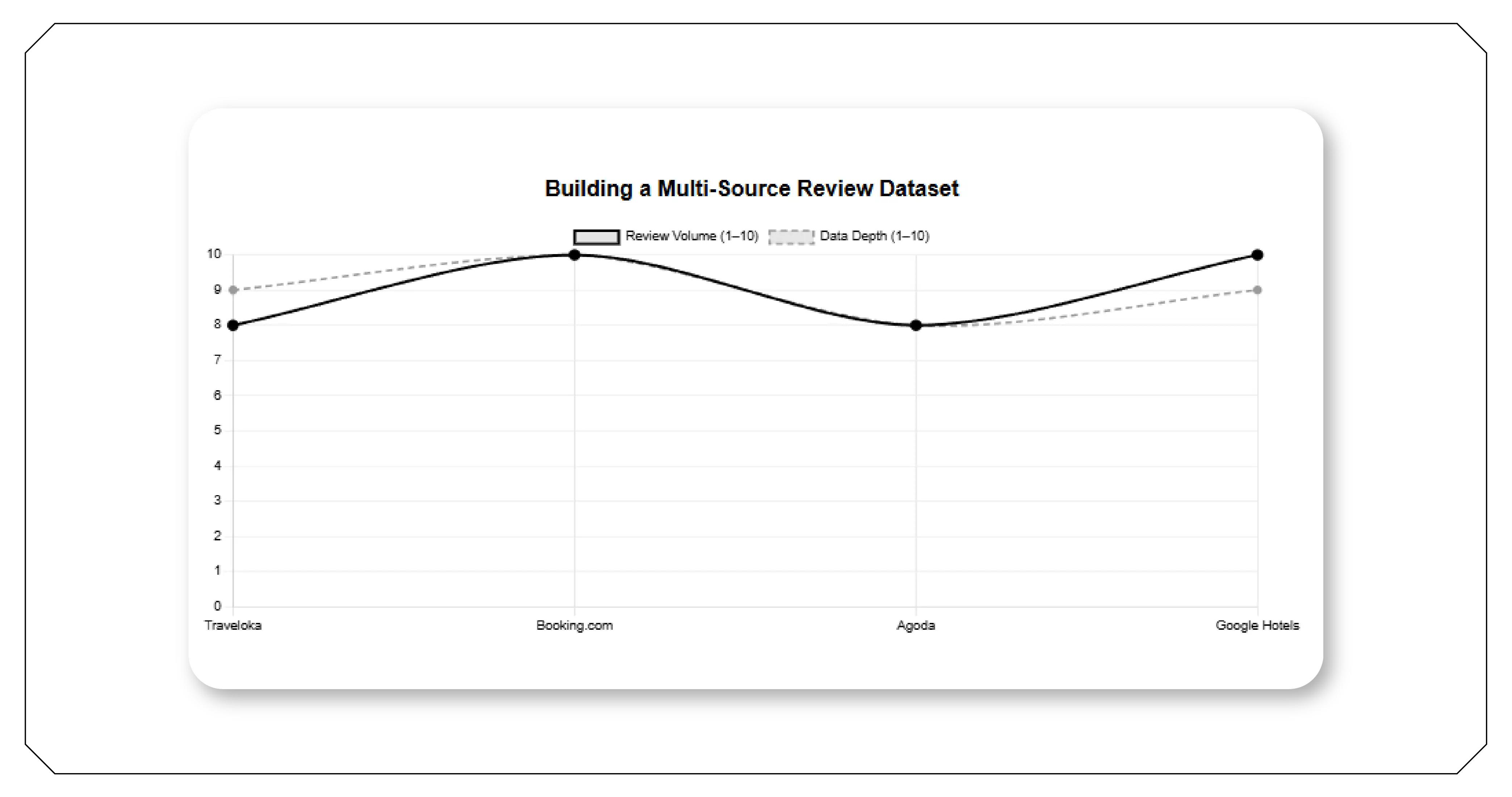How Can Businesses Extract hotel Reviews and feedback Data to Improve Guest Satisfaction?

Introduction
The hospitality industry thrives on digital experiences and user feedback. Travelers today rely more on online reviews than ever before to make booking decisions, and businesses analyze this vast pool of insights to shape their marketing and service strategies. To make informed, data-backed decisions, companies need to Extract hotel Reviews and feedback Data from multiple sources to capture the complete voice of the customer.
Collecting and analyzing Hotel Guest Review Dataset allows researchers, hotel owners, and analysts to uncover patterns in satisfaction, service quality, and traveler sentiment across global markets. These insights serve as a foundation for improving customer experience, reputation management, and competitive benchmarking in the hotel sector.
Similarly, businesses aiming to Scrape Traveloka review Data can gain insights into the preferences of Asian travelers, hotel performance trends, and region-specific expectations that differ from Western or European markets. Understanding what guests discuss in their reviews enables a data-driven strategy to enhance services, pricing, and marketing efforts.
Why Scraping Hotel Reviews Matters?

Online hotel reviews are goldmines of consumer intelligence. Each review carries information about a traveler’s experience, covering room quality, cleanliness, amenities, staff behavior, and nearby attractions. For analysts, scraping this information at scale enables:
- Sentiment Analysis: Understanding whether reviews express satisfaction or disappointment.
- Competitive Benchmarking: Comparing service levels and satisfaction metrics across hotels.
- Trend Identification: Spotting recurring issues or highlights like breakfast quality, Wi-Fi performance, or room comfort.
- Customer Persona Insights: Analyzing language and preferences of business travelers, couples, or families.
With millions of reviews available on online travel agencies (OTAs) and platforms like Google Hotels, businesses can extract data systematically to support market research and AI-driven analytics.
Core Platforms for Hotel Review Data Scraping
There are four major global sources of hotel review data — Traveloka, Booking.com, Agoda, and Google Hotels. Each platform has unique user demographics, interface designs, and review features that make them valuable in different ways.
Let’s look at how to scrape and process reviews from each platform effectively.
Scraping Reviews from Traveloka
Traveloka is one of Southeast Asia’s leading travel booking platforms, serving users primarily in Indonesia, Malaysia, Thailand, and Singapore. The review section of Traveloka is comprehensive, offering ratings on cleanliness, comfort, service, and location.
How to Scrape Traveloka Reviews:
- Step 1: Identify hotel URLs and review pages using Traveloka’s search parameters or hotel listing API endpoints.
- Step 2: Extract elements like review text, reviewer name, rating, review date, and room type.
- Step 3: Use a web scraping framework like Scrapy or BeautifulSoup in Python.
- Step 4: Clean and normalize data to handle multilingual entries, emojis, and inconsistent formats.
For regional research and marketing optimization, datasets generated from Traveloka provide a highly accurate reflection of local traveler expectations.
Building a Booking.com Review Dataset
Among global travel platforms, Booking.com is one of the most data-rich sources for hotel reviews. Its vast international coverage makes it ideal for understanding global hospitality trends. Businesses, analysts, and hotel chains often rely on the Booking.com Guest Reviews Dataset to identify competitive benchmarks and satisfaction trends.
Elements of Booking.com Reviews:
- Overall rating (out of 10)
- Specific scores (cleanliness, comfort, value for money, facilities, etc.)
- Country of reviewer
- Verified stay label
- Review title and content
To Extract Booking.com hotel reviews, use scraping libraries like requests, lxml, or Selenium for dynamic loading pages. Store extracted data in structured formats like CSV or JSON for further sentiment analysis or NLP processing.
When aggregated, Booking.com data reveals detailed performance metrics across thousands of hotels, providing valuable intelligence for brand reputation monitoring and operational improvements.
Scraping Agoda Reviews for Deep Market Insights
Agoda is another Asia-focused OTA known for extensive customer feedback and international hotel listings. Its review data includes both quantitative and qualitative aspects, enabling a balanced view of traveler experiences. A structured Agoda Guest Reviews Dataset helps researchers map out regional satisfaction patterns and pricing sensitivities.
Steps for Agoda Review Scraping:
- Identify Target URLs: Locate the review pages from Agoda’s hotel listings.
- Automate Data Extraction: Use Python or R to scrape review titles, reviewer demographics, room details, and date of stay.
- Handle Pagination: Agoda reviews are often paginated; scrape sequentially to collect complete datasets.
- Language Detection and Translation: Agoda hosts reviews in multiple languages — integrate APIs like Google Translate for normalization.
The value of Agoda Hotel reviews scraping lies in the diversity of perspectives, as Agoda attracts both Asian and Western travelers, offering insights into cross-cultural satisfaction drivers.
Extracting Reviews from Google Hotels
Google Hotels has become a central hub for review aggregation. It combines data from OTAs, Google Maps, and direct user submissions, making it one of the most comprehensive sources of guest sentiment.
A Google Hotel Search Guest Reviews Dataset enables comparative analytics across platforms, as many reviews come from verified Google accounts, ensuring authenticity.
To Extract Google Hotel review data, you can leverage:
- Google Maps APIs: For review snippets, ratings, and reviewer profiles.
- HTML Parsing Tools: For directly scraping review sections.
- Natural Language Processing (NLP): To analyze review sentiment and identify frequently mentioned service elements.
This dataset can reveal key drivers of satisfaction, helping hotels refine service offerings and benchmark their reputation against competitors listed in Google search results.
Structuring and Cleaning the Review Data
Once the data is collected, the next step is cleaning and structuring it to ensure usability in analytics models. Here’s how to process the scraped reviews effectively:
Data Cleaning Steps:
- Remove Duplicates: Filter repeated reviews across multiple OTA platforms.
- Handle Missing Values: Fill blanks using imputation or exclude incomplete records.
- Normalize Text: Convert all text to lowercase, remove special characters, and correct encoding issues.
- Extract Keywords: Use text-mining techniques to identify key terms like “service,” “location,” or “cleanliness.”
Data Structuring:
Organize reviews into a schema with fields such as:
- Hotel Name
- Reviewer Name
- Rating
- Review Date
- Language
- Country
- Review Content
- Platform (Traveloka / Booking.com / Agoda / Google)
This standardized format helps streamline analysis and comparison across datasets.
Sentiment and Text Analytics on Hotel Reviews
Once structured, the review data can be analyzed for sentiment, tone, and topic clustering using modern AI tools. Sentiment analysis helps determine customer satisfaction, while topic modeling reveals which areas (e.g., food, comfort, location) matter most to travelers.
Common Analytical Methods:
- Polarity Scoring: Classify reviews as positive, negative, or neutral.
- Emotion Detection: Identify emotions like happiness, anger, or disappointment.
- Topic Modeling: Use Latent Dirichlet Allocation (LDA) or BERTopic to categorize themes.
- Word Cloud Generation: Visualize the frequency of commonly mentioned words.
For instance, by analyzing sentiment across Booking.com and Agoda reviews, hotels can pinpoint regions where customers perceive their value proposition differently.
Overcoming Challenges in Hotel Review Scraping
While web scraping offers immense benefits, it also poses technical and ethical challenges. Here’s how to navigate them responsibly:
Common Challenges:
- Anti-Scraping Mechanisms: Many OTAs use JavaScript rendering and CAPTCHA systems.
- Dynamic Content: Reviews may load asynchronously, requiring tools like Selenium or Playwright.
- Legal Restrictions: Always review the platform’s Terms of Service before scraping.
- Multilingual Text: Requires additional preprocessing for accurate analysis.
Mitigation Tips:
- Use IP rotation and request throttling to prevent blocking.
- Integrate API-based solutions where available for compliant data access.
- Implement data anonymization to protect user privacy.
- Use scraping responsibly, focusing on aggregate insights rather than individual user data.
Tools and Technologies for Hotel Review Scraping
Several tools and libraries support automated review extraction, text cleaning, and analysis.
Popular Python Libraries:
- Requests: For sending HTTP requests to fetch pages.
- BeautifulSoup: For parsing HTML and extracting structured data.
- Selenium or Playwright: For handling dynamically loaded content.
- Pandas: For structuring datasets and performing data transformations.
- TextBlob / NLTK / SpaCy: For sentiment analysis and NLP.
Cloud-Based Platforms:
- Scrapy Cloud or Apify: For large-scale scraping workflows.
- Google Cloud NLP API: For analyzing sentiment and entity recognition.
- AWS Lambda: For running scheduled scraping scripts efficiently.
Using these technologies ensures reliability and scalability in hotel review data collection across OTAs.
Building a Multi-Source Review Dataset

Combining reviews from different OTAs yields a holistic understanding of a hotel’s market reputation. For instance:
| Platform | Review Volume | Typical Rating Scale | Region Focus | Data Depth |
|---|---|---|---|---|
| Traveloka | High | 1–10 | Southeast Asia | Strong in regional insights |
| Booking.com | Very High | 1–10 | Global | Extensive global coverage |
| Agoda | High | 1–10 | Asia-Pacific | Balanced traveler feedback |
| Google Hotels | Very High | 1–5 | Global | Aggregated multi-source reviews |
Integrating reviews from multiple platforms enables cross-validation of sentiments and helps identify discrepancies in rating systems or traveler profiles.
Applications of Scraped Hotel Review Data
The use cases for hotel review scraping are diverse and extend far beyond reputation tracking.
a. Market Research
Analyze traveler preferences by geography, season, or travel purpose. Identify emerging destinations and traveler behavior patterns.
b. Competitor Benchmarking
Compare average ratings and sentiment scores among competitors within the same location or category.
c. Price-Value Perception
Evaluate how guests perceive pricing fairness versus competitors.
d. Predictive Analytics
Use machine learning models to predict guest satisfaction or likelihood of repeat bookings based on textual sentiment.
e. Hotel Performance Dashboards
Integrate review data into BI dashboards for real-time visualization of customer satisfaction trends.
Ethical and Legal Considerations
While scraping public review data is common in research and analytics, it’s crucial to follow ethical guidelines:
- Always check if scraping aligns with the platform’s data access policies.
- Do not scrape personal identifiers such as email addresses or contact info.
- Use scraped data for analytical or educational purposes, not commercial redistribution.
- Comply with GDPR and other data privacy laws.
Ethical data collection helps maintain the credibility and compliance of hospitality analytics initiatives.
Automating Review Scraping with APIs and Pipelines
For ongoing hotel analytics, automation is key. APIs and ETL (Extract, Transform, Load) pipelines enable continuous data flow.
- API Integration: Some OTAs provide public or partner APIs for structured review access.
- ETL Scheduling: Tools like Airflow or Prefect can automate daily scraping jobs.
- Data Warehousing: Store cleaned review data in BigQuery, Snowflake, or AWS Redshift for advanced querying.
- Machine Learning Models: Build predictive models using Python or TensorFlow to analyze satisfaction and forecast trends.
Automation ensures that businesses stay updated with the latest customer opinions in near real-time.
Future of Hotel Review Data Analytics
As AI-driven travel platforms evolve, hotel review data will increasingly power personalization engines, pricing algorithms, and service quality metrics. Real-time scraping pipelines will integrate NLP, predictive analytics, and even voice-of-customer intelligence for deeper insights.
The convergence of review data, location intelligence, and user demographics will create 360-degree customer experience models, enabling hotels to adapt offerings dynamically.
How Travel Scrape Can Help You?
Multi-Platform Hotel Data Coverage: We gather data from top travel platforms such as Google Hotels, Traveloka, Agoda, and Booking.com for complete market visibility.
Advanced Review Mining: Our scraping systems extract detailed guest reviews, ratings, and sentiments to help analyze service quality and customer perception.
Dynamic Pricing Intelligence: We monitor real-time hotel price changes, seasonal trends, and competitor rate shifts across regions and categories.
Customizable Data Pipelines: Our scraping solutions can be adjusted to your preferred data fields, frequency, and delivery format.
Data Integration Support: We help integrate scraped hotel datasets into your BI tools, CRM systems, or data analytics dashboards for seamless insights.
Conclusion
In the data-driven era of hospitality, online reviews act as a mirror of guest satisfaction. Businesses and researchers who systematically Web scraping hotel review data from OTAs can harness actionable intelligence for service improvement, reputation management, and market forecasting.
Through structured datasets, real-time pipelines, and sentiment analytics, organizations can achieve a holistic view of customer satisfaction trends. Leveraging Real Time Scrape Hotel Reviews data allows hoteliers to respond swiftly to feedback and enhance traveler experiences.
Finally, incorporating Web Scraping Traveloka Hotels Data into broader OTA scraping strategies ensures that businesses remain globally competitive, continuously adapting to the evolving expectations of modern travelers.
Ready to elevate your travel business with cutting-edge data insights? Scrape Aggregated Flight Fares to identify competitive rates and optimize your revenue strategies efficiently. Discover emerging opportunities with tools to Extract Travel Website Data, leveraging comprehensive data to forecast market shifts and enhance your service offerings. Real-Time Travel App Data Scraping Services helps stay ahead of competitors, gaining instant insights into bookings, promotions, and customer behavior across multiple platforms. Get in touch with Travel Scrape today to explore how our end-to-end data solutions can uncover new revenue streams, enhance your offerings, and strengthen your competitive edge in the travel market.
.webp)
